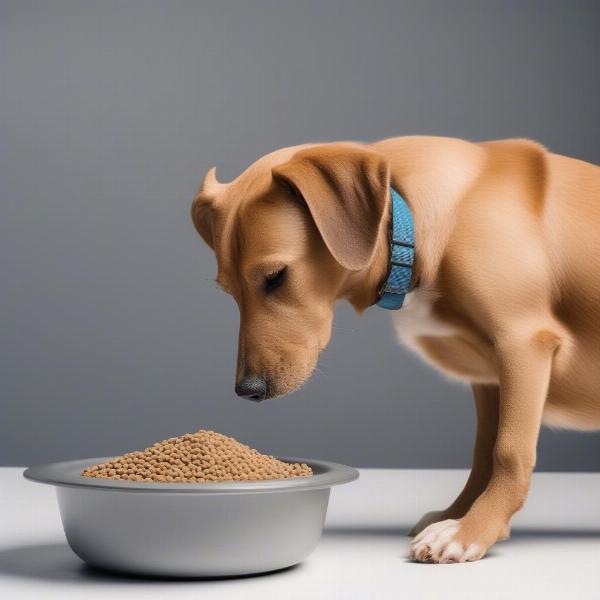Itchy skin in dogs is a common problem that can be caused by a variety of factors, including allergies, parasites, and infections. While veterinary care is crucial for diagnosis and treatment, adjusting your dog’s food for itchy dog situations can play a significant role in managing and even preventing this uncomfortable condition. Choosing the right food for itchy dog symptoms can be a game-changer. This guide will explore the various dietary considerations and options available to help soothe your itchy companion.
Understanding the Link Between Diet and Itchy Skin
What your dog eats directly impacts their overall health, including skin and coat condition. Food allergies are a frequent culprit behind itchy skin. Common allergens include beef, chicken, dairy, wheat, and soy. Even if your dog isn’t allergic, certain ingredients can trigger sensitivities that manifest as itching, redness, and inflammation.
Choosing the Right Food for Itchy Dogs
Selecting the best food for itchy dog problems requires careful consideration of ingredients, potential allergens, and your dog’s individual needs. Here are some key factors to keep in mind:
- Limited Ingredient Diets: These diets contain a smaller number of ingredients, making it easier to identify and eliminate potential allergens. They often feature novel protein sources like venison, duck, or kangaroo, which are less likely to trigger a reaction in dogs with common food allergies. best food for dogs with itchy skin uk offers a comprehensive list of suitable options.
- Hydrolyzed Protein Diets: In these diets, proteins are broken down into smaller pieces, making them less recognizable to the immune system and reducing the likelihood of an allergic reaction.
- Grain-Free Diets: While not always necessary, grain-free diets can be beneficial for some dogs with itchy skin, especially those with sensitivities to grains like wheat or corn.
 Dog eating hypoallergenic food
Dog eating hypoallergenic food
Homemade Dog Food for Itchy Skin: Is it a Good Option?
Preparing homemade dog food for itchy skin can offer greater control over ingredients, but it requires careful planning to ensure nutritional balance. Consult with a veterinary nutritionist to create a recipe that meets your dog’s specific needs and avoids potential deficiencies.
What if My Dog’s Itching Persists?
If dietary changes alone don’t resolve your dog’s itching, consult your veterinarian. They can perform tests to identify the underlying cause and recommend appropriate treatments, which might include medications, topical therapies, or further dietary adjustments. You can compare different dog food brands with our dog food comparison tool.
Beyond Diet: Other Factors Contributing to Itchy Skin
While diet plays a crucial role, other factors can also contribute to itchy skin. These include:
- Parasites: Fleas, ticks, and mites can cause intense itching and skin irritation.
- Environmental Allergies: Pollen, dust, and mold can trigger allergic reactions in some dogs.
- Infections: Bacterial or fungal infections can lead to itchy skin lesions.
“Addressing itchy skin requires a holistic approach,” says Dr. Emily Carter, DVM. “While diet is a cornerstone of management, it’s essential to consider other potential contributors like parasites and environmental allergens.”
Conclusion
Finding the right food for itchy dog relief can significantly improve your furry friend’s comfort and quality of life. By understanding the link between diet and itchy skin, and by carefully considering the available options, you can help your dog achieve a healthier, itch-free existence. Remember to consult with your veterinarian for personalized guidance and to rule out any underlying medical conditions. best dog food for itchy skin uk is another resource that may help you in your search.
FAQ
- What is the best food for dogs with itchy skin? There’s no one-size-fits-all answer. The best food will depend on your dog’s individual allergies and sensitivities. Limited ingredient and hydrolyzed protein diets are often good starting points.
- Can changing my dog’s food cure their itchy skin? Dietary changes can significantly improve itchy skin caused by food allergies or sensitivities, but it might not be a cure-all if other factors are involved.
- How long does it take to see results after changing dog food? It can take several weeks or even months to see noticeable improvements in your dog’s skin after a dietary change.
- Should I make my own dog food for itchy skin? Homemade diets can be beneficial, but they require careful planning to ensure nutritional balance. Consult with a veterinary nutritionist.
- What are the signs of a food allergy in dogs? Common signs include itchy skin, excessive scratching or licking, gastrointestinal upset, and ear infections.
- Is grain-free dog food always better for itchy skin? Not necessarily. While some dogs benefit from grain-free diets, others might not. It’s important to identify the specific ingredients triggering your dog’s itching.
- What else can I do to help my itchy dog besides changing their food? Consult your veterinarian for other treatment options, such as medications, topical therapies, and parasite control.
ILM Dog is a leading online resource for dog owners worldwide, offering expert advice on all aspects of dog care, from breed selection and health to training, nutrition, and grooming. We strive to provide reliable, practical information to help you give your furry friend the best possible care. For personalized guidance on choosing the right products and services for your dog, contact us at [email protected] or call us at +44 20-3965-8624. Learn more at ILM Dog.